The civil rights leader Ralph Abernathy called Nasas moonshot an inhuman priority while poor children went hungry
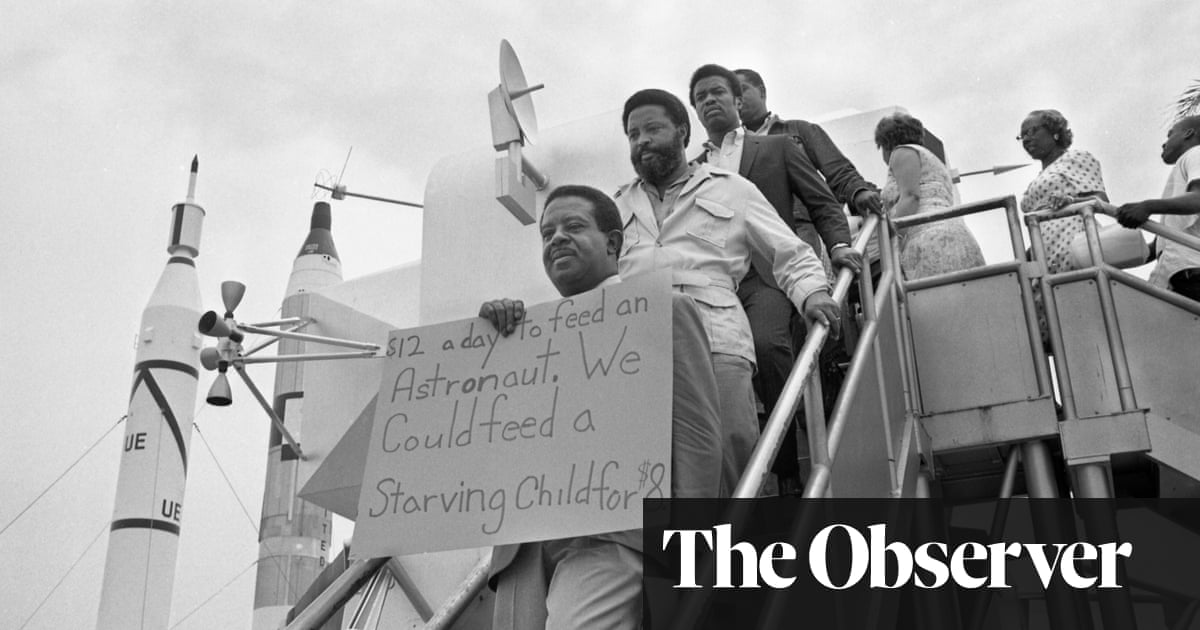
The date was 15 July 1969. As the Saturn V rocket towered over the launchpad, about to send the first men to the moon, two dozen black families from poor parts of the south, accompanied by mules and wagons emblematic of the civil rights movement, marched to the fence of Cape Kennedy in Florida. From a birds eye view, they would have resembled dwarves in the wake of a colossus.
They were led by Ralph Abernathy, successor to the slain Martin Luther King as head of the Southern Christian Leadership Conference (SCLC). He carried a sign that said bluntly: $12 a day to feed an astronaut. We could feed a starving child for $8. He told a rally at the site: We may go on from this day to Mars and to Jupiter and even to the heavens beyond, but as long as racism, poverty and hunger and war prevail on the Earth, we as a civilised nation have failed.
The Apollo 11 mission has been hailed as humankinds greatest technological achievement and, after the turmoil of the 1960s, a redemptive moment of national and international unity. Speaking to astronauts Neil Armstrong and Buzz Aldrin on the lunar surface in what he described as the most historic telephone call ever made, President Richard Nixon declared: For one priceless moment in the whole history of man, all the people on this Earth are truly one.
Yet it was myth making then and will be again as America commemorates this months 50th anniversary with events, exhibitions and TV specials. The Apollo programme, motivated by the space race against the Soviet Union, cost $25.4bn, the equivalent of $180bn today; only the Vietnam war hit taxpayers harder. While Nasa warned Congress No bucks, no Buck Rogers, polls showed a majority of Americans opposed the moondoggle.
The black press questioned how the price tag could be justified when millions of African Americans were still mired in poverty. Testifying to the US Senate on race and urban poverty in 1966, King had observed in a few years we can be assured that we will set a man on the moon and with an adequate telescope he will be able to see the slums on Earth with their intensified congestion, decay and turbulence.
An inhuman priority
The protest march on the eve of Apollo 11s launch opened a new chapter in the poor peoples campaign, which had built a makeshift city at the National Mall in Washington a year earlier.
Tom Paine, the administrator of Nasa, walked out to meet the demonstrators. An official Nasa history recalls: Paine stood coatless under a cloudy sky, accompanied only by Nasas press officer, as Abernathy approached with his party, marching slowly and singing We Shall Overcome.
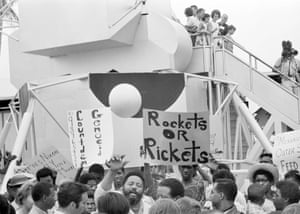
Several mules were in the lead, as symbols of rural poverty. Abernathy then gave a short speech. He deplored the condition of the nations poor, declaring that one-fifth of the nation lacked adequate food, clothing, shelter and medical care. In the face of such suffering, he asserted that space flight represented an inhuman priority. He urged that its funds be spent to feed the hungry, clothe the naked, tend the sick and house the homeless.
Paine replied that if we could solve the problems of poverty by not pushing the button to launch men to the moon tomorrow, then we would not push that button. He added that Nasas technical advances were childs play compared to the tremendously difficult human problems that concerned the SCLC. He offered the hope that Nasa indeed might contribute to addressing these problems, and then asked Abernathy, a minister, to pray for the safety of the astronauts. Abernathy answered with emotion that he would certainly do this, and they ended this impromptu meeting by shaking hands all around.
Among the protesters at Cape Kennedy (now know as Cape Canaveral) that day was JT Johnson, a civil rights activist who had been with King in Memphis shortly before he died and became a close aide to Abernathy. They didnt want you too close to where it was launching, so we just picked us a spot and decided to have us a rally and started talking and singing the songs brought us through these difficult times and we just did what we do, Johnson recalled in an interview at his home in a suburb of Atlanta.
At that time, the whole movement was around poverty and poor people so thats all we talked about: how poor we are and how is this thing going to the moon and spending millions when we dont have any and some people dont have a place to live or food to eat, but we still allow all of these things to happen. That was the real protest: billions for the moon and pennies for the poor.
A project of white America
Johnson is now an 81-year-old grandfather. Hes still politically active and hopes to tell more about the story of the civil rights movement. Wearing a blue T-shirt in his red dining room, he recalled growing up during the era of Jim Crow segregation in Montezuma, Georgia.
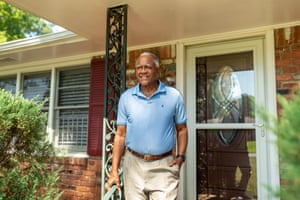
It had a big water fountain downtown with a colored sign and a white sign when all the water was coming from the same place, he said. As a child I couldnt understand because most of these things didnt seem fair to me. So the Lord knew that I was going to be in the movement before I did, because I didnt know it and some of the things I just didnt like. It wasnt fair.
As for so many, King became his lodestar. When I met Dr King, I thought that was the man Id been waiting to see for all of my life and I dedicated myself to the civil rights movement.
In one protest in the 1960s, Johnson and others jumped into a whites-only swimming pool in St Augustine, Florida, only for the hotel owner to pour acid into the pool. After trying to integrate another swimming pool in Albany, Georgia, he was imprisoned for six days and went on hunger strike. In this context, President John F Kennedys dream of putting a man on the moon by the end of the decade seemed a luxury that America could not afford.
I think it was all about PR really for the United States and Russia, he said. I think this country has never really taken care of people here African Americans never got their share; they spread it around everybody else.
Indeed, the Apollo programme gave every impression of being a project of white America. As footage of the era is replayed to mark the semicentennial, it is striking that all 12 people who walked on the moon were white men, and so too the overwhelming majority of officials, engineers and scientists at mission control. The musician and poet Gil Scott-Herons Whitey on the Moon summed up: A rat done bit my sister Nell / With Whitey on the moon / Her face and arms began to swell / And Whiteys on the moon.
Johnson said: We didnt hear an invitation; we didnt get anything. So we thought that was a disgrace and a disrespect to all of us It was white people that was privileged in this country and theyd made it like that for themselves.
A proud American
Johnson did not linger at Cape Kennedy to witness the epic Saturn V rocket launch. But like spellbound millions around the world, he did watch on TV when Armstrong set foot on the lunar surface. He recalled: I guess it was exciting to see that happen, to be very frank with you, but here again the next day we were going back to the same thing. How do we feed our hungry?
Others, however, felt differently. Abernathy did stay to watch the launch in person. A college professor and maths teacher, he was not opposed to Apollo per se, but rather the nations distorted sense of national priorities.
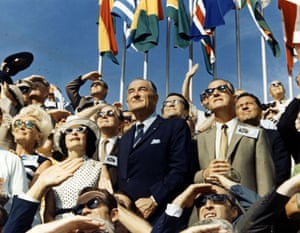
His daughter, Donzaleigh, who was an 11-year-old girl at the time, said by phone: He wanted to bring attention to the fact that were spending billions to send men to the moon yet we cannot feed hungry children in America. By doing this my father also brought the attention of members of Congress to the issue of hunger and poverty.
It ended up being a win-win situation all way around: my dad said he felt like a really proud American and that, for just a moment when that rocket launched into space, it wasnt about hunger, it wasnt about poverty, it was about an accomplishment of human beings to go forth. And thats miraculous within itself.
Donzaleigh, an actor who appeared alongside Meghan, Duchess of Sussex in the drama Suits, shares her fathers ultimately positive view of space exploration. I dont believe that it would be right or fair to say no I think that would be counterproductive to the greater good of humanity.
However, you cannot do that singularly and not look back at those who are in front of your face every single day who are starving, who are wallowing in poverty.
Nasas spin-offs
Donzaleigh recalled that Abernathy had a vivid impact on the Nasa scientists, inspiring them to use technology to tackle pressing domestic needs such as air and water pollution. Scientists do have an ability to impact our world in a positive way and they did that and Im just so glad that the scientists listened, she said.
According to Neil Maher, an associate professor at the New Jersey Institute of Technology and Rutgers University, although Nasa never stated publicly that Abernathys protest pressured it to address the poverty of African Americans, it began taking steps to address those problems soon after.
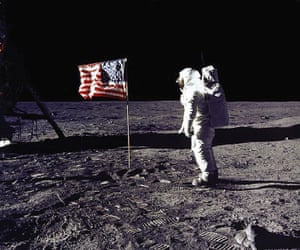
In 1972 the space agency created an Urban Systems Project Office at the Johnson Space Center in Houston, which retooled technologies deployed for Apollo for use instead in Americas inner cities, Maher, author of Apollo in the Age of Aquarius, said via email. Such spin-offs included water filtration systems, air pollution monitoring technologies, and even energy efficient heating and cooling systems from the Apollo space capsule for use instead in low-income housing projects.
While such efforts had the best of intentions, many of these technologies unfortunately failed to dramatically improve the daily life of African Americans living in Americas cities.
After Armstrongs giant leap for mankind, the novelty quickly wore off, public interest in moon landings waned and doubts over the expense of it all only intensified. Nixon cut the Apollo programme short and rejected a proposal to build a moon base. In the years since, the Nasa workforce, including astronauts, has diversified significantly, and America elected its first black president. But the nation that put a man on the moon has still not solved racism, inequality or poverty.
For Johnson, who was at the SCLC for 17 years and went on to set up a political consultancy, there is a sense of disappointment and wasted opportunities. He avoids driving in downtown Atlanta where people sleep rough under bridges: That hurts my heart. He, for one, will not be celebrating the golden anniversary of that transcendent moment on Earths nearest neighbour.
This country is still the same, people are still poor and theyre still hungry and that has not been corrected, he said. So here we are still playing the same game and no one is really protesting out there.
What I want to see is the end of poverty, people not hungry, people have a home and can enjoy life, and we put our money into science so we can get rid of Alzheimers, MS and all these different things that cripple us. We can live very happily in our own clothes and, as my grandma said, our own mind, until we die. Thats the way Id like to see this Earth.
Read more: https://www.theguardian.com/science/2019/jul/14/apollo-11-civil-rights-black-america-moon


Recent Comments